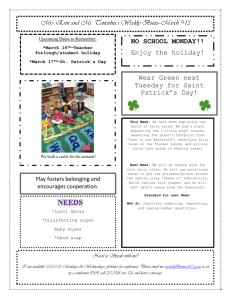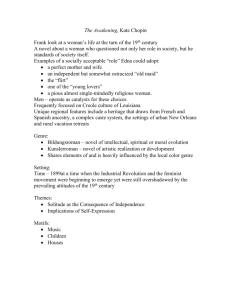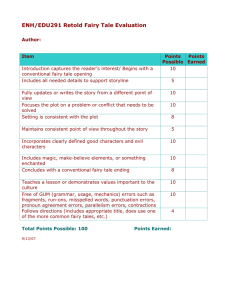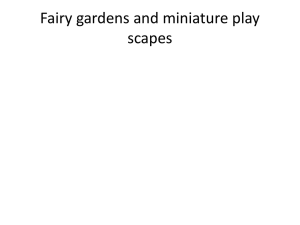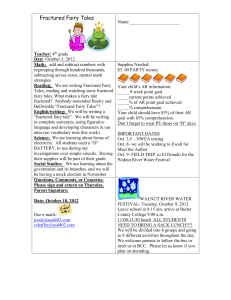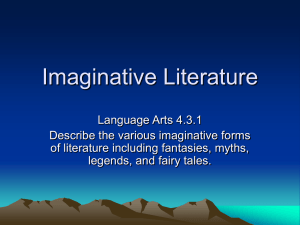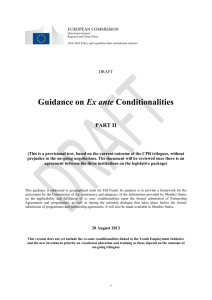Subject: Language B English
advertisement
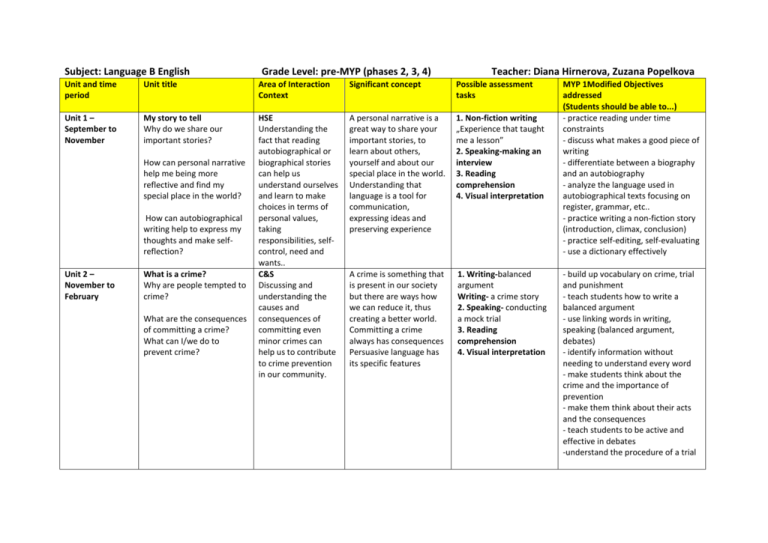
Subject: Language B English Grade Level: pre-MYP (phases 2, 3, 4) Teacher: Diana Hirnerova, Zuzana Popelkova Unit and time period Unit title Area of Interaction Context Significant concept Possible assessment tasks Unit 1 – September to November My story to tell Why do we share our important stories? HSE Understanding the fact that reading autobiographical or biographical stories can help us understand ourselves and learn to make choices in terms of personal values, taking responsibilities, selfcontrol, need and wants.. C&S Discussing and understanding the causes and consequences of committing even minor crimes can help us to contribute to crime prevention in our community. A personal narrative is a great way to share your important stories, to learn about others, yourself and about our special place in the world. Understanding that language is a tool for communication, expressing ideas and preserving experience 1. Non-fiction writing „Experience that taught me a lesson” 2. Speaking-making an interview 3. Reading comprehension 4. Visual interpretation A crime is something that is present in our society but there are ways how we can reduce it, thus creating a better world. Committing a crime always has consequences Persuasive language has its specific features 1. Writing-balanced argument Writing- a crime story 2. Speaking- conducting a mock trial 3. Reading comprehension 4. Visual interpretation How can personal narrative help me being more reflective and find my special place in the world? How can autobiographical writing help to express my thoughts and make selfreflection? Unit 2 – November to February What is a crime? Why are people tempted to crime? What are the consequences of committing a crime? What can I/we do to prevent crime? MYP 1Modified Objectives addressed (Students should be able to...) - practice reading under time constraints - discuss what makes a good piece of writing - differentiate between a biography and an autobiography - analyze the language used in autobiographical texts focusing on register, grammar, etc.. - practice writing a non-fiction story (introduction, climax, conclusion) - practice self-editing, self-evaluating - use a dictionary effectively - build up vocabulary on crime, trial and punishment - teach students how to write a balanced argument - use linking words in writing, speaking (balanced argument, debates) - identify information without needing to understand every word - make students think about the crime and the importance of prevention - make them think about their acts and the consequences - teach students to be active and effective in debates -understand the procedure of a trial Unit 3 – February to mid April Food for thought- a sustainable world What are the differences between lifestyles of various communities? How does our lifestyle influence our world? ENVs Understanding the fact that our lifestyle influences our environment and at the same time environment influences our lifestyle. If we learn about and try to understand the life and perspectives of people from own and other cultures, it will help us to make positive changes in our own and other communities and build better future 1. Poster presentation How does my lifestyle influences the world around me? 2. Writing-A report 3. Reading compr. Correlation between Eating habits and the environment 4. Visual interpretation - teach students how to do a presentation, what makes a good presentation (planning, check list, note cards, audience, …) - study/improve vocabulary focused on sustainable lifestyle and descriptive adjectives - understand how to use present simple and present cont. properly - know how to make a poster, how to select information for a poster - learn different ways of reading and to answer questions after reading a text HI Learning that despite the fact that first fairy tales had been made up by people long ago, many of them have been modified/modernized over time and are still alive; understanding the purpose of fairy tales. Understanding that fairy tales have a significant impact on children and that their morals have a strong educational value. 1. Fairy tale writing 2. Role play performance Fairy tale 3. Reading compr. A modern fairy tale 4. Visual interpretation - teach students how to use descriptive language - teach students how to describe their imagination - learn how to write a fairy tale (narrative writing) - learn how to play/perform a story - practice role-playing with scripts - study new vocabulary and irregular verbs (past simple) - discuss the impact and purpose of fairy tales on society How can we live to preserve our societies and environment? Unit 4 – Mid April to June Fairy tales What is the purpose of fairy tales? Do fairy tales change over time? How can I have a personal involvement as an innovator of fairy tales? Subject: Language B English Grade Level: MYP2 (phases 2, 3, 4) Teacher: Sonja Miler, Zuzana Popelkova Unit and time period Unit title Area of Interaction Context Significant concept Possible assessment tasks Unit 1 School and Education ENVs What impact does School is the most important part of our 1.Debate In Pairs MYP2 Modified Objectives addressed (Students should be able to ......) = learn vocabulary connected to education September to midNovember Unit 2 school/education have on my life? How can I contribute to my school community? What makes a good student? early lives. Mystery Stories HI What makes a good mystery story? Why do people write fiction? Reading / writing stories develops our imagination. Racism C&S Why do some people become racists? Why do people hate other people? What are the consequences of indifferent attitudes towards problems of others? How can we prevent discrimination and racism? HSE How can I look after myself? Which health issues did not affect me when I was younger but they do now, when I ma a teenager? (smoking, drugs, STD, depressions, peer pressure, stress, …) We can learn to respect other people but never on the basis of the skin of their color, religion or sexual preferences. 1. Presenting the information from an article 2. Grammar and Vocabulary Test 3. Reading comp. 4. Visual Text Interp. 5. Anti-racism Poster We want our student to realize and know what the most typical health issues are that influence teens and how to cope with them. 1. Oral Presentation 2. Role-play At a specialist 3. Writing a leaflet 4. Reading comp. 5. Visual Text Int. Mid – November to the End of January Unit 3 February to the mid-April Unit 4 Mid – April to the end of June Healthy teenager 2. Writing a Descriptive Essay 3. Grammar and Vocabulary Test 4. Reading Comprehension 5. Visual Text Interpretation 1. Vocabulary Test 2. Writing a Mystery Story 3. Reading compr. = review present tenses and be able to use them properly = take turns in discussions and express own ideas clearly = develop their creativity and fantasy = learn new vocabulary = use past simple and past continuous tense = improve their descriptive writing skills = work in groups more effectively = assess themselves and their peers = work with dictionaries = develop critical thinking skills = communicate information, ideas and opinions in an oral presentation = respond and react to questions, ideas from the audience = use clear pronunciation and/or intonation = use a format and structure appropriate for a written format = correctly use a range of vocabulary and grammatical structures Subject: Language B English Grade Level: MYP 3 (phases 3 and 4) Teacher: Sonja Miler, Zuzana Popelkova Unit and time period Unit title Area of Interaction Context Significant concept Possible assessment tasks Unit 1 – September to the beginning of November Travelling What influence does tourism have on our environment? ENVs Understanding the fact that tourism has a tremendous impact on the environment. On the other hand, the environment, climate of specific resorts determine their prospects for tourism development. Learning the difference in use of simple and continuous tenses, making narration more impressive and realizing the fact that tourism has strong impact on the environment of holiday resorts. 1. Making a travel brochure 2. Oral presentation on a famous traveler 3. Reading compr. 4. Visual Text Interpretation on various problems during travel How can I help my friends with their personal or family problems? C&S Through this AOI the students will learn that real friends are those who stay with you even when you face family, relationship or any or personal problems and try to help you. Learning how to write an informal letter effectively, to use past simple and past perfect tenses correctly and understanding the fact that good friends always help each other regardless the situation they face. 1. Writing an informal letter to a magazine for teenagers asking for help on some personal problems 2. Role play – giving advice on relationship and family problems 3. Reading compr. 4. Visual Txt Interpret. Technology How will our life look in 100 HI Understanding the fact Creating and presenting a poster 1. Creating and presenting a Poster How does the environment influence tourism prospects? Unit 2 – November to Mid-January Unit 3 – MidJanuary to mid- Relationships What is a real friend? MYP 1Modified Objectives addressed (Students should be able to ...) - study/improve vocabulary focused on travelling and descriptive adjectives - use direct speech in a story - understand how to use simple and continuous tenses properly - teach them different ways of reading including multiple choice - make narration more impressive using adjectives, time phrases, dramatic devices - demonstrate understanding of specific information and attitudes in a written context - use past perfect tense appropriately - use appropriate vocabulary related to friendship - practice giving advice phrases - use appropriate structures and vocabulary when writing an informal letter - practice giving feedback to peers - learn/revise past and passive structures March years? What will be different and will be the same? Which things will we stop using? Why? Unit 4 – Mid – March to the end of June Work Why do people have to work? What would you like to do after you finish school? Why? What are your rights and responsibilities? Subject: Language B English Unit and time period Unit 1 – September to the end of October that inventions significantly facilitate our everyday lives but when not being dealt with carefully, they might be abused. effectively, using passive structures correctly and learning that although technology has made a huge progress in the last decades, it has not resulted in positive consequences only. about the history of some inventions 2. A speech on future developments with questions from audience 3. Reading compr. 4. Visual Txt. - do research on inventions - create and present a poster -explore what makes a good speech - learn features of speech practice register, tone, pronunciation, eye contact - give peer evaluation - learn and practice how to identify main idea in a text - build up new vocabulary related to technology HSE Through this AOI the students will comprehend that every work is important in the society and that they should work hard to enhance their gifts, abilities or skills in order to achieve their jobs of dreams. Learning new vocabulary related to the topic, writing a formal letter effectively and understanding the fact that they are responsible for their professional lives and that it is necessary to value every profession. 1. Formal letter writing – letter of application 2. Role-play Job interview 3. Reading compr. - build up vocabulary related to work - use reported speech correctly communicate ideas, opinions and information in a written and spoken form - use appropriate structures and vocabulary when writing a formal letter, in particular a letter of application - practice giving feedback to peers Grade Level: MYP 4 (phases 3 & 4 ) Unit title Taking a viewpoint Area of Interaction Context C&S Significant concept We sometimes have to give our opinion and we need to do it effectively Teacher: Alec Carter, Zuzana Popelkova Possible assessment tasks 1. Oral discussion – taking a viewpoint about an issue of local concern 2. Creative writing -based on a controversial school- Objectives addressed (Students should be able to ......) - express opinions clearly and defend them. - find factual material to support a standpoint. - appreciate opposing based topic. 3. Reading comp. – based on a report of a local issue. 4. Visual Interpretation – written reactions to a YouTube item views and counter them. - extract specific and implied information from a given text. - research information (including on the internet) and present results of the research in written form, correctly citing sources. - extract specific and implied information from a given text. - undertake biographical research. - make comparisons using suitably chosen criteria - extract specific and implied information from a given text. Unit 2 – November to the end of January To what extent is the internet a safe place? ENV It is wise to know the features and characteristics of the environment we are in. 1. Oral presentation – Safety on the internet 2. Research report – How and why the internet was invented. 3. Reading comp. – “Sexting” Unit 3 – February to midApril Celebrity HSE How does celebrity affect those who achieve it? 1. Role play – interviewing a selected celebrity 2. A comparison – comparing the careers of two selected celebrities 3. Reading comp. – The 2010 Academy Awards. Unit 4 – Mid April – mid June Is life fair? HI How do we react in situations which seem to be unfair? 1. Discussion – a case conference about the return to school in a wheelchair of an accident victim. 2. A descriptive article – explaining the details and implications of a particular learning problem 3.Reading comp. – the - consider the circumstances of others in different circumstances - explain how a specific problem can affect people - extract specific and implied information from a given text. final part of Flowers for Algernon Subject: Language B English Unit and time period Grade Level: MYP 5 (phases 3 & 4) Unit title Area of Interaction Context Teacher: Alec Carter, Diana Hirnerova Significant concept Unit 1 – September - October What are the important milestones in my life? HSE There are things that happen in our lives which are very significant for us from which we can learn lessons for our future life. Unit 2 – November to the end of January Why be green? ENV We have a responsibility towards our surroundings Unit 3 – February to mid-April Great inventions around us HI How and why things are invented, and what impact these inventions have on society. Possible assessment tasks 1. Poster presentation – “Significant moments in my life so far and what they have taught me” 2. An autobiography 3. Reading comp. – an autobiography with a moral message to be understood. 4. Visual interpretation 1. Group discussion a discussion about local “green” initiatives. 2. Written proposals – A document highlighting a “green” problem in school with suggestions for its solution. 3. Reading comp. – based on texts involving “green” solutions 4. Visual interpretation 1. Oral presentation – the life story of a famous inventor 2. Research report – Objectives addressed (Students should be able to ......) - appreciate what constitutes “significant on a personal level - present matters of personal significance without embarrassment - extract specific and implied information from a given text. - identify environmental problems and their possible solutions - present proposals in a clear and persuasive way - extract specific and implied information from a given text. - research and present biographical details, correctly cited. - assess what constitutes Unit 4 – Mid – April to mid - June Personalities that changed the world C&S How do great personalities influence other people and history? the origins of a significant invention 3. Reading comp. – “Embracing the artificial limb” 4. Visual interpretation 1. Historical sketch – an important event in the life of an influential personality 2. Cause & Effect essay – an essay about the cause(s) and effect(s) of a historical event. 3. Reading comp. – reading about and understanding a historical event with widespread effects. 4. Visual interpretation “famous” and “significant” in terms of inventors and inventions - extract specific and implied information from a given text. - present information through drama - appreciate the effect(s) of things that happen and how they may affect the future. - extract specific and implied information from a given text.
